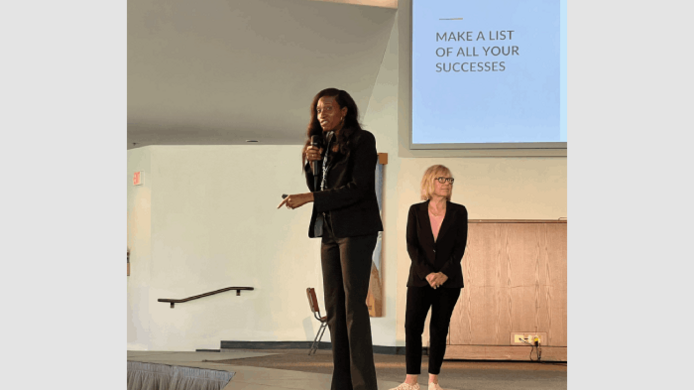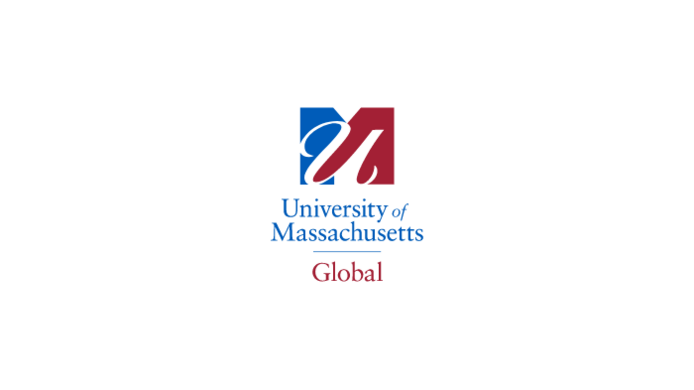Have questions about enrollment, degree programs, financial aid, or next steps?

UMass Global alum Dr. Rebecca Pianta (front) presents on healthy ways of thinking alongside her former faculty advisor Dr. Marilou Ryder (rear).
Photo courtesy of Dr. Ryder.
IRVINE, Calif. (Feb. 14, 2023) – Graduation Day can actually be the beginning of a new chapter in the faculty-student relationship. One example: University of Massachusetts Global alumna Dr. Rebecca Pianta (Ed.D., ’20) continues to collaborate with professor of education Dr. Marilou Ryder. As colleagues, Pianta and Ryder have teamed to help educators, especially women, make the jump to leadership roles.
“I just love the story of students and professors working together on research that they developed and designed together,” Ryder said. “It just comes full circle.”
Pianta and Ryder have both studied the differences between healthy ways of thinking and that lead to confidence and resilience and self-defeating mentalities. Recognizing the reality of life challenges and social barriers that are beyond one’s ability to control, Pianta and Ryder nevertheless encourage others to prepare to overcome difficulties by taking ownership of their own thoughts and habits.
“Let’s focus on the area that you have control of right now,” Pianta said.
She and Ryder recently shared their approach to building mental strengths with educators attending the annual meeting for the Association of California School Administrators chapter covering Orange County. During their Jan. 28 presentation, “Be Your Best Self on a Good Day,” Pianta and Ryder acknowledged external obstacles including hectic work and family lives, as well as malign factors like gender discrimination, can impede educators who want to climb the ladders leading to administrative posts.
Yet individuals can still seize a greater degree of autonomy over their internal lives. This, Pianta and Ryder say, means people can improve their lives by being aware of whether they are psychologically short-changing themselves and learning to replace self-sabotaging thoughts with realizations and actions that enable them to show their talents to people around them.
Self-sabotaging thoughts can take many forms, Pianta and Ryder explained. These include fear and worrying, which can manifest as the feeling that one has not really earned their place in life, a phenomenon known as imposter syndrome. Other examples of self-sabotaging thoughts include thinking too small and not taking sufficient time to reflect and figure out what one really wants out of life.
Pianta, who now serves as the Santa Ana Unified School District’s college and career readiness coordinator, said one of the best ways for individuals to overcome self-limiting behaviors is to build a power web with others who are willing to offer different forms of support, such as mentoring and advocating for one’s value. Additional recommendations outlined in the presentation include speaking up when one has a solution to a problem, accepting compliments, and accepting the need for self-promotion.
“If you’re not telling your story and all that you have to offer, people make assumptions,” said Pianta, who also observed that several men who attended the Jan. 28 workshop could also relate to the ideas under discussion.
Pianta and Ryder have shared a collaborative relationship for several years. Ryder advised Pianta while the latter completed her doctoral dissertation, “Female Superintendents’ Self-Sabotaging Behaviors and Their Journey to Reclaiming Their Power.”
Pianta’s scholarship examined how several female superintendents working in Southern California K-12 experienced and overcame self-sabotage. She focused on women in K-12 leadership while other doctoral candidates, in Pianta’s words “all of us coming together to help others overcome their self-sabotage,” researched similar fields including the judiciary and local government.
Ryder has herself addressed related topics as a researcher and author. She wrote “Rules of the Game: How to Win a Job in Educational Leadership” (Delmar Publishing, 2nd Edition 2016) and co-authored “The SexX Factor: Breaking the Unwritten Codes That Sabotage Personal and Professional Lives.” (New Horizon Press, 2003).
These works put Pianta’s and Ryder’s learning within reach of academic and professional audiences. By continuing their collaboration at the Jan. 28 conference, they accepted a new opportunity to share their research findings.
“We just thought it was real cool that a professor and student could take her research, which was grounded in my original research, and present it together in front of her colleagues,” Ryder said.


